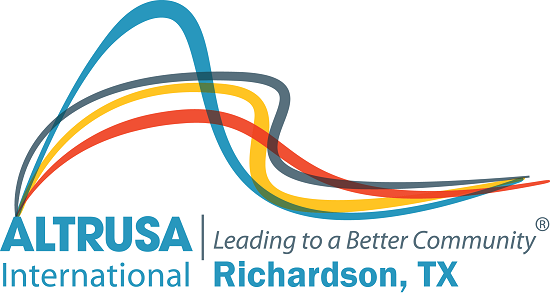ALTRUSA HISTORY
On April 11, 1917, the first Altrusa club was founded in Nashville, Tennessee. It became the first national organization of business and professional women. The Altrusa Institute (as it was originally known) was a chain of national clubs where business and professional women could meet and exchange ideas.
The name “Altrusa” was coined from ALT (altruism) and USA (United States) – possibly because of high-running World War I patriotism. Mamie L. Bass, Altrusa’s first national president, was enchanted with the name for its “devotion to the interests of others” concept.
Mamie L. Bass felt that Altrusa could serve a higher purpose. In June 1918, when Altrusa held its first convention in Indianapolis, Bass’s vision became a reality. The Altrusa Institute became a classified service organization for women. As a classified service organization, the Altrusa Institute renamed itself the National Association of Altrusa Clubs and adopted By-Laws that laid the groundwork for today’s Altrusans. Soon after, Mamie L. Bass created the Principles of Altrusa which defined Altrusa as "a builder of women" and an organization based on merit and accomplishment. The Principles were officially adopted in 1921 along with a major club building effort. By 1922, Altrusa had 20 clubs.
Altrusa became Altrusa International in 1935 when Altrusa organized its first club in Mexico. From that first step over US borders in 1935, Altrusa moved into Puerto Rico, Chile, Ecuador, Mexico, India, Korea, Russia, Ukraine, Ireland, Great Britain, Bermuda, Canada, and New Zealand. In 1946, Altrusa sent its first representative to the United Nations.
In the sixties, Altrusans began to look to America’s youth as the future of Altrusa. In 1966, ASTRA (acronym formed from “Ability”, Service”, “Training”, “Responsibility”, and “Achievement”) was established. ASTRA service clubs target young people (age 12 to 25) and encourage them in their educations, professions and service to society. Expanding on its commitment to youth, Altrusa adopted literacy as on going service in 1977. In 1997, Altrusa Foundation adopted Camp Safe Haven for children with HIV/AIDS.
Today, Altrusa International, Inc. has 387 clubs existing in 13 countries comprising of 11,188 Altrusans world wide. Altrusans support international programs, raise money for local charities, volunteer at battered women’s shelters, help runaway teens, build houses for Habitat for Humanity, create and support literacy programs, and so much more. Inspired by Thoreau, Mamie L. Bass put it best, "it is not enough to be good; Altrusans must be good for something."
Altrusa International, Inc. of Richardson, Texas, one of the largest clubs in District Nine (Texas), was established in 1967. Membership generally runs between sixty-five and seventy-five members each year.
The prime purpose of Altrusa Richardson is to provide service, locally and internationally, through community service projects and donations that result from our annual fundraisers. These fundraisers have evolved through the years:
•· Small efforts at fundraising were the norm in the early years of the club (i.e. sale of kolaches, cement garden stones shaped like Texas, a dress line and hand-made crafts).
•· In 1982, a silent auction was combined with a fashion show that used local city notables – men and women – as models.
•· A live and silent auction was popular for many years. From 2002-2005, the live and silent auction was combined with a Las Vegas Casino theme as our major fund raiser.
•· In 2004, our first Outstanding Women of Today…Builders of Tomorrow Awards Luncheon was held. This luncheon continues to honor local women and their achievements in different fields of endeavor.
In 1986, then President Susan Frensley devised what she called the “Five-Year Plan”, whereby a specified amount of money was set aside from each of our annual fundraisers for a five-year period. At the end of that time, we had sufficient funds available for our service projects the following year. This very positive action has resulted in the ability of our club to earmark all funds raised in one year to be spent in the next, and thus budget with certainty the amount of money we have to spend on our service projects for each coming year.
In 1991, Julianne Lovelace investigated and implemented the process required for our Club to be granted 501(c)3 IRS status, enabling our donors to give tax-deductible donations to our Foundation.
Our projects include both hands-on and financial support. We have a wide variety of projects our members can choose from. Some are conducted during the day, some at night, and some on weekends. Because we have many and varied projects in which we may be involved, there are opportunities for all members to participate.
Excerpts from Altrusa International, Inc. Encyclopedia
and Altrusa International Website (http://www.altrusa.com/General/History.asp)
